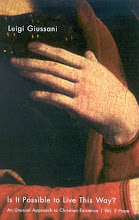We had a sharing from the Brazilian Movement this morning. Things happen there on a huge scale. The Movement supports 50,000 university students, and has negotiated lower uni fees allowing many poorer people to get a university education. They have 100,000 other participants.
The story they told was about their problems with one of the universities they were working with, and how they overcame them despite the university pulling out of their agreement. As Carron out it, these people walked straight through a cordon of armed police, and challenged an eviction order by telling the bailiff the story of the ten lepers. The bailiff gave up and went home, and has joined the Movement.
What kind of certainty is needed to accomplish such things? A certainty based on an experienced reality. And the proof of this faith is freedom, especially freedom from fear.
Carron then summed up the past two days for us, homing in on two issues.
First, the temptation to shift away from faith as knowledge and into a cold moralism. This happens to all of us; at a certain point I start to ask whether I am "worthy". When this happens, I become ashamed to admit I am simply attracted to Christ. I want to earn my way. I start to talk about coming to School of Community for the fellowship, or some other reason, anything but the real reason, anything that avoids the fact of my dependence.
This shift to moralism is really an immorality, and refusal to acknowledge the beautiful things Christ does for us. Christ isn't interested talking about our unworthiness. When we accept this in simplicity, we are attracted to Him. We forget our unworthiness, and turn back to reality. As we heard in a film last night, "The things that you have to do simply wear you out. It is what attracts you that moves you".
The second issue is the reduction of faith that our culture forces on us. Anyone who reduces Christianity to a formula, who divorces it from the fullness of reason and our humanity, has not experienced real faith. Where is the 'shiver of risk'? When I affirm the reality of Christ, is it a mere feeling, or a conviction in my guts? We could latch onto doctrine in order to avoid this challenge, but that would just be a formula again. Faith implies a movement. Without the risk of a movement towards Christ who lies behind and within reality, we might avoid mistakes, but we won't have real faith or knowledge of reality.
Giussani's solution is radical: don't start from some cooked-up idea of God, start from the experience of human reality. It's in Chapter 10 of The Religious Sense. Our self is awakened in the encounter with this reality. This is the beginning of knowledge; wonder in the face of reality. I cannot explain this reality without acknowledging a Mystery even more real than reality itself.
A sign is not a label we place on reality. Reality itself is a sign. Reality represents something Other, something within and beyond it. We recognise this whenever we ask 'why does this reality exist?' It's like getting a delivery of flowers; the first thing we ask is 'who did this?'
So: faith does not begin as a feeling or an idea. It begins as the fact of an event, something undeniable. It is not some emotional or philosophical leap into the invisible. It is something Other that hits us, moves us, makes us jump like nothing else. If I do not seek this reality, I end up with a 'fideism' instead of faith, belief based on subjective feeling, an ideology that I can give no reason for. Real faith is a reasonable step, based on an encounter. It starts outside of us, not inside. Faith isn't about what we can't see; it is primarily about what we can see.
As children of Descartes and Kant, we find this hard to grasp. Thinkers like Feuerbach took their ideas further, saying that faith is nothing more than an irrational leap in the dark. How do we know this is wrong? Because this conception of faith, of knowledge, leaves reality unexplained. Reality requires a reasonable explanation, including an explanation for the fact that I exist. We don't want to leave our heads at home to have faith. True faith involves our reason and our full humanity.
The test of this faith is whether it gives the satisfaction our heart's desire. This isn't the same as being smart and successful. It is more like wearing shoes the right size - we know immediately when we are wearing the wrong size, and in the same way we know immediately what satisfies our hearts. The problems arise from our lack of loyalty to our own experience, our own selves - if we lack this loyalty, we can fail to acknowledge our dissatisfaction. We need the simplicity, the humility, to recognize our true needs. The alternative is a kind of idolatry, a false idea of what we need.
What we really desire is the infinite. Only a real and mysterious You can correspond to our need. This is what we are invited to; anything less makes faith unreasonable. Each of us has a personal responsibility to these facts of our experience; we can't shift this responsibility to others.
Friday, August 22, 2008
Subscribe to:
Post Comments (Atom)


No comments:
Post a Comment